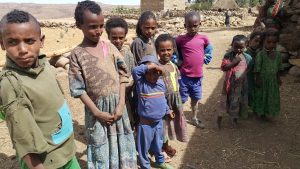On February 11, 2015, Kalle Hirvonen from ESSP delivered a presentation on the relationship between children’s diet, nutrition knowledge and access to markets at the Ethiopian Development Research Institute (EDRI). In total, 24 people attended. This presentation follows a series of papers considering important factors that affect feeding practices and the nutrition of children in Ethiopia.
This particular research focused on the impact of improving households’ nutrition knowledge and children’s diet diversity with market access. Survey data were analyzed from an area with a large variation in transportation costs over a relatively short distance, which enabled researchers to assess the impact of household nutrition knowledge with varying access to markets but still within similar agro-climatic conditions.
The key finding of this research is that nutrition knowledge leads to considerable improvements in children’s diets, but only in areas with relatively good market access. Improving nutrition knowledge in the most remote localities has no impact on children’s dietary diversity.
Hirvonen concluded that in order to improve nutrition in Ethiopia, policy makers need to focus on solving both supply (access to foods) and demand side (knowledge) constraints. Behavioral Change Communication is an effective tool to tackle the demand side constraints but only in areas characterized by good access to food markets, yet tackling the supply side is more difficult. In the long run, Hirvonen noted that access to foods should be mediated through food markets that are well-integrated within the country. In the short run, more remote households may have to be self-sufficient in producing the foods they want to consume, but as pointed out, this may not be possible in all areas as agro-climatic conditions impose constraints to farmers' production choices. He also pointed out there are efficiency gains from specialization, and by encouraging households to diversify their food production undermines these gains.
This presentation was organized by ESSP with support from EDRI. ESSP is a collaborative program undertaken by IFPRI and EDRI, whose objective is to help improve the policy-making decision process in Ethiopia.
To read more about this research, a new Working Paper will soon be published. Please subscribe to receive regular updates on ESSP’s work and its quarterly newsletter.
Keep updated with cutting edge research in Ethiopia.
